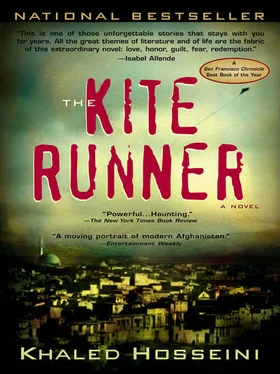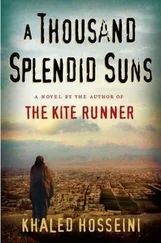She kissed my father’s hands. Sat beside me at last, her eyes downcast.
The applause swelled.
ACCORDING TO TRADITION, Soraya’s family would have thrown the engagement party, the Shirini-khori – or “Eating of the Sweets” ceremony. Then an engagement period would have followed which would have lasted a few months. Then the wedding, which would be paid for by Baba.
We all agreed that Soraya and I would forgo the Shirini-khori . Everyone knew the reason, so no one had to actually say it: that Baba didn’t have months to live.
Soraya and I never went out alone together while preparations for the wedding proceeded – since we weren’t married yet, hadn’t even had a Shirini-khori , it was considered improper. So I had to make do with going over to the Taheris with Baba for dinner. Sit across from Soraya at the dinner table. Imagine what it would be like to feel her head on my chest, smell her hair. Kiss her. Make love to her.
Baba spent $35,000, nearly the balance of his life savings, on the awroussi , the wedding ceremony. He rented a large Afghan banquet hall in Fremont – the man who owned it knew him from Kabul and gave him a substantial discount. Baba paid for the chila s, our matching wedding bands, and for the diamond ring I picked out. He bought my tuxedo, and my traditional green suit for the nika – the swearing ceremony.
For all the frenzied preparations that went into the wedding night – most of it, blessedly, by Khanum Taheri and her friends – I remember only a handful of moments from it.
I remember our nika . We were seated around a table, Soraya and I dressed in green – the color of Islam, but also the color of spring and new beginnings. I wore a suit, Soraya (the only woman at the table) a veiled long-sleeved dress. Baba, General Taheri (in a tuxedo this time), and several of Soraya’s uncles were also present at the table. Soraya and I looked down, solemnly respectful, casting only sideway glances at each other. The mullah questioned the witnesses and read from the Koran. We said our oaths. Signed the certificates. One of Soraya’s uncles from Virginia, Sharif jan, Khanum Taheri’s brother, stood up and cleared his throat. Soraya had told me that he had lived in the U.S. for more than twenty years. He worked for the INS and had an American wife. He was also a poet. A small man with a birdlike face and fluffy hair, he read a lengthy poem dedicated to Soraya, jotted down on hotel stationery paper. “ Wah wah , Sharif jan!” everyone exclaimed when he finished.
I remember walking toward the stage, now in my tuxedo, Soraya a veiled pari in white, our hands locked. Baba hobbled next to me, the general and his wife beside their daughter. A procession of uncles, aunts, and cousins followed as we made our way through the hall, parting a sea of applauding guests, blinking at flashing cameras. One of Soraya’s cousins, Sharif jan’s son, held a Koran over our heads as we inched along. The wedding song, ahesta boro , blared from the speakers, the same song the Russian soldier at the Mahipar checkpoint had sung the night Baba and I left Kabul:
Make morning into a key and throw it into the well,
Go slowly, my lovely moon, go slowly.
Let the morning sun forget to rise in the east,
Go slowly, my lovely moon, go slowly.
I remember sitting on the sofa, set on the stage like a throne, Soraya’s hand in mine, as three hundred or so faces looked on. We did Ayena Masshaf , where they gave us a mirror and threw a veil over our heads, so we’d be alone to gaze at each other’s reflection. Looking at Soraya’s smiling face in that mirror, in the momentary privacy of the veil, I whispered to her for the first time that I loved her. A blush, red like henna, bloomed on her cheeks.
I picture colorful platters of chopan kabob, sholeh-goshti , and wild-orange rice. I see Baba between us on the sofa, smiling. I remember sweat-drenched men dancing the traditional attan in a circle, bouncing, spinning faster and faster with the feverish tempo of the tabla, until all but a few dropped out of the ring with exhaustion. I remember wishing Rahim Khan were there.
And I remember wondering if Hassan too had married. And if so, whose face he had seen in the mirror under the veil? Whose henna-painted hands had he held?
AROUND 2 A.M., the party moved from the banquet hall to Baba’s apartment. Tea flowed once more and music played until the neighbors called the cops. Later that night, the sun less than an hour from rising and the guests finally gone, Soraya and I lay together for the first time. All my life, I’d been around men. That night, I discovered the tenderness of a woman.
IT WAS SORAYA who suggested that she move in with Baba and me.
“I thought you might want us to have our own place,” I said.
“With Kaka jan as sick as he is?” she replied. Her eyes told me that was no way to start a marriage. I kissed her. “Thank you.”
Soraya dedicated herself to taking care of my father. She made his toast and tea in the morning, and helped him in and out of bed. She gave him his pain pills, washed his clothes, read him the international section of the newspaper every afternoon. She cooked his favorite dish, potato shorwa , though he could scarcely eat more than a few spoonfuls, and took him out every day for a brief walk around the block. And when he became bedridden, she turned him on his side every hour so he wouldn’t get a bedsore.
One day, I came home from the pharmacy with Baba’s morphine pills. Just as I shut the door, I caught a glimpse of Soraya quickly sliding something under Baba’s blanket. “Hey, I saw that! What were you two doing?” I said.
“Nothing,” Soraya said, smiling.
“Liar.” I lifted Baba’s blanket. “What’s this?” I said, though as soon as I picked up the leather-bound book, I knew. I traced my fingers along the gold-stitched borders. I remembered the fireworks the night Rahim Khan had given it to me, the night of my thirteenth birthday, flares sizzling and exploding into bouquets of red, green, and yellow.
“I can’t believe you can write like this,” Soraya said.
Baba dragged his head off the pillow. “I put her up to it. I hope you don’t mind.”
I gave the notebook back to Soraya and left the room. Baba hated it when I cried.
A MONTH AFTER THE WEDDING, the Taheris, Sharif, his wife Suzy, and several of Soraya’s aunts came over to our apartment for dinner. Soraya made sabzi challow – white rice with spinach and lamb. After dinner, we all had green tea and played cards in groups of four. Soraya and I played with Sharif and Suzy on the coffee table, next to the couch where Baba lay under a wool blanket. He watched me joking with Sharif, watched Soraya and me lacing our fingers together, watched me push back a loose curl of her hair. I could see his internal smile, as wide as the skies of Kabul on nights when the poplars shivered and the sound of crickets swelled in the gardens.
Just before midnight, Baba asked us to help him into bed. Soraya and I placed his arms on our shoulders and wrapped ours around his back. When we lowered him, he had Soraya turn off the bedside lamp. He asked us to lean in, gave us each a kiss.
“I’ll come back with your morphine and a glass of water, Kaka jan,” Soraya said.
“Not tonight,” he said. “There is no pain tonight.”
“Okay,” she said. She pulled up his blanket. We closed the door.
Baba never woke up.
THEY FILLED THE PARKING SPOTS at the mosque in Hayward. On the balding grass field behind the building, cars and SUVs parked in crowded makeshift rows. People had to drive three or four blocks north of the mosque to find a spot.
Читать дальше












